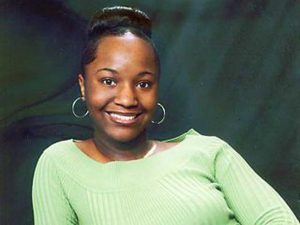Tatyana Ross
Editor-in-Chief
Latasha Norman was a junior accounting major and staff writer for the student newspaper, The Blue and White Flash and a member of the yearbook staff. She was from Greenville, Miss. and was reported missing on Nov. 13, 2007 after she was last seen walking to class.
Originally reported missing to campus police, her family and friends became worried after they could not contact her all day.
Stanley Cole, an ex-boyfriend, eventually confessed to murdering her and led authorities to her body two weeks after her disappearance on Nov. 29, 2007 in a wooded area in North Jackson.
Further investigation revealed Norman was involved in an abusive relationship with her ex-boyfriend, Cole who was also from Greenville, Miss.
Norman was raised by her parents Patricia and Danny Bolden in a big family with strong Christian values. She was loved by family and the many friends she made on the campus of Jackson State.
“We decided ten years ago to become advocates against domestic violence. My wife and I and my family will continue this fight and continue to speak out because this is the only avenue that some young ladies will hear. If a young lady is raised up in an environment where abuse is going on, she may grow up thinking that this is the way it’s supposed to be. And it’s not. That’s why we have to continue to speak out and represent,” said Danny Bolden, Norman’s father, in a previous Flash story about the Latasha Norman Run/Walk.
Alexander Blanton, a senior music education major and Jackson native said none of his relationships have resulted in domestic violence. However, some of his closest friends have been in situations that did not end well.
“I was a kid when I first heard about Latasha Norman. But I was raised that you should never raise your hand to a woman. No matter what,” Blanton said. “One of my best friends was in a bad relationship a couple of years ago. Things were not that bad at first.”

Blanton expressed that during most of the acts he witnessed he was under the impression that the two were only “play-fighting”. He only realized later into their relationship that it was more serious than what meets the eye.
“I didn’t really notice until I kept seeing bruises on her. At first it was like some minor bruising on her arm. And it progressed to having different cuts and scrapes on her neck,” he said.
Blanton said that it bothered him the most once he found out she was choked-out by her boyfriend during an argument.
“No, the worst time was when they got into an argument and she ended up in the hospital. I found out that he literally choked her to sleep,” Blanton said. “When I calmed down, I told her that day she had to choose to leave him or I would interject.”
Blanton said he noticed his friend was not ready to leave her boyfriend despite the physical and psychological trauma.
“After she got out the hospital she went right back to his house. And I was kind of done after that,” Blanton said. “I was never in any type of abusive relationship but I have gotten in altercations where I would have to choose to walk away.”
Kenyader Dixon, a veterinary science graduate from Jackson, Miss., said he has had few run-ins with domestic abuse.
“I remember the Latasha Norman case. I was young though. But I guess I didn’t understand the seriousness of it until I watched that episode of Fatal Attraction,” Dixon said.
If you or someone you know is in a domestic violence situation, students can contact the Latasha Norman Center at 601-979-0374. You can also call the National Domestic Violence Hotline at 1-800-799-7233.





Be First to Comment